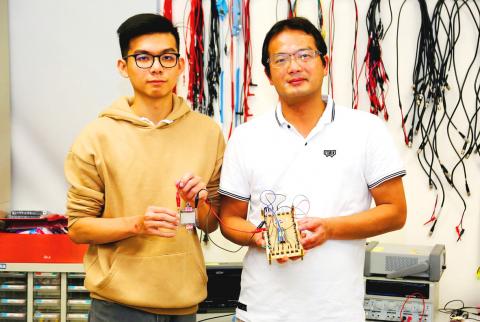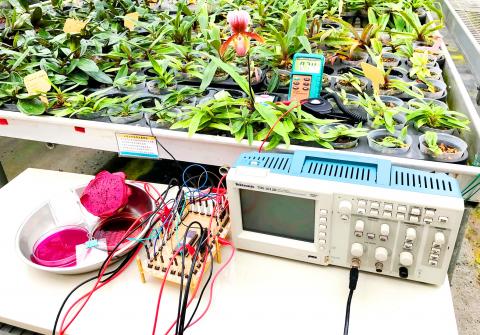Researchers have developed a method to create dye-sensitized solar cells (DSSCs) using dragon fruit extracts.
Out of concern for the environment and to reduce pollution caused by the production and disposal of traditional solar panels, Chien Liang-yu (簡亮語) researched organic solar cells for two years, said National Chiayi University electrical engineering professor Chiang Cheng-ta (江政達), who advised Chien.
By experimenting with solar cells manufactured with dye from dragon fruit, Chien discovered that compared with other fruit, it achieved the “most obvious” voltage when applied to fluorine-doped tin oxide films, Chiang said.

Photo: CNA
By coupling the solar cell with a conversion chip, Chien created a highly sensitive “dragon fruit solar inverter,” Chiang said.
The properties of the solar cell could be used to measure sunlight intensity, such as in an orchid greenhouse, he said.
Unlike other types of power generation systems, DSSCs produce less pollution and are cheaper to manufacture, said Chien, who has been admitted to a graduate program in National Chung Hsing University’s Department of Electrical Engineering.

Photo: CNA
However, compared with traditional solar cells, DSSCs still have room for improvement in terms of their solar energy conversion efficiency, he said.
It would be worthwhile to develop designs that can achieve high solar energy conversion efficiency and are also environmentally friendly, he added.
Traditional solar cells made from silicon or thin films need to be made in clean rooms, requiring a high level of technology and involving a complex manufacturing process, Chiang said.
In contrast, the technology required to manufacture DSSCs, such as slot die coating or extrusion coating, is less complex, he said.
DSSCs can also be manufactured and assembled in non-vacuum environments and at room temperature, he added.
Although it is relatively easy to create DSSCs, their production still mostly involves synthetic dyes, not those produced from fruit or vegetables, Chiang said.
While synthetic dyes are capable of achieving high efficiency, they create problems in terms of pollution, he said.
Natural dyes can be extracted from fruit — such as blueberries, raspberries, blackberries, pomegranates, cranberries and dragon fruit — or vegetables in order to minimize the level of pollution, he added.
Any fruit or vegetable that contains proanthocyanidins could be used as a substitute material, Chiang said, adding that in their research, he and Chien used dragon fruit as the main source of dyes.
A study the two authored on using dragon fruit dyes to create DSSCs was published in the peer-reviewed IEEE Sensors Journal on Feb. 4.

The Sports Administration yesterday demanded an apology from the national table tennis association for barring 17-year-old Yeh Yi-tian (葉伊恬) from competing in the upcoming World Table Tennis (WTT) United States Smash tournament in Las Vegas this July. The sports agency said in a statement that the Chinese Taipei Table Tennis Association (CTTTA) must explain to the public why it withdrew Yeh from the WTT tournament in Las Vegas. The sports agency said it contacted the association to express its disapproval of the decision-making process after receiving a complaint from Yeh’s coach, Chuang

The Hualien Branch of the High Court today sentenced the main suspect in the 2021 fatal derailment of the Taroko Express to 12 years and six months in jail in the second trial of the suspect for his role in Taiwan’s deadliest train crash. Lee Yi-hsiang (李義祥), the driver of a crane truck that fell onto the tracks and which the the Taiwan Railways Administration's (TRA) train crashed into in an accident that killed 49 people and injured 200, was sentenced to seven years and 10 months in the first trial by the Hualien District Court in 2022. Hoa Van Hao, a

Control Yuan Secretary-General Lee Chun-yi (李俊俋) tendered his resignation last night, admitting that he had misused a government vehicle, as reported by media. His resignation was immediately accepted by the Control Yuan. In a statement explaining why he had resigned, Lee apologized for using a Control Yuan vehicle to transport his dog to a pet grooming salon on May 20. The issue first came to light late last month, when TVBS News reported that Lee had instructed his driver to take the dog to the salon. The news channel broadcast photos that it said were taken by an unnamed whistle-blower, which purportedly showed the

Taipei has once again made it to the top 100 in Oxford Economics’ Global Cities Index 2025 report, moving up five places from last year to 60. The annual index, which was published last month, evaluated 1,000 of the most populated metropolises based on five indices — economics, human capital, quality of life, environment and governance. New York maintained its top spot this year, placing first in the economics index thanks to the strength of its vibrant financial industry and economic stability. Taipei ranked 263rd in economics, 44th in human capital, 15th in quality of life, 284th for environment and 75th in governance,